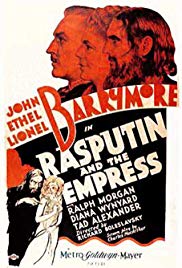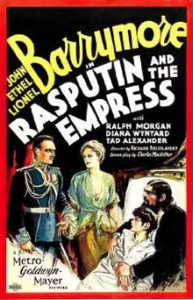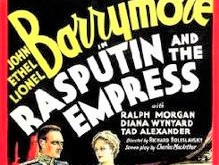Rasputin and the Empress *** (1932, John Barrymore, Lionel Barrymore, Ethel Barrymore, Diana Wynyard, Ralph Morgan, C Henry Gordon) – Classic Movie Review 7455
Director Richard Boleslawski’s 1932 MGM drama Rasputin and the Empress is famed in movie history as the only film in which sibling superstars John Barrymore, Lionel Barrymore and Ethel Barrymore appeared together. But, unfortunately, there are only a couple of short scenes where all three are on screen at the same time.
Anyway, the only film to star the three Barrymores (and with Ethel’s first movie appearance in 14 years as the Tsarina Alexandra, and so her first sound film) gives Lionel Barrymore a great opportunity as the manipulative mad monk Grigori Yefimovitch Rasputin, who is supposedly killed by Prince Paul Chegodieff (John Barrymore), a character based on the real Prince Yousoupoff or Feliks Yusupov, the name changed for legal reasons, as Yousoupoff was still alive.
Obviously there is a lot of interest surrounding the film, but as a movie Rasputin and the Empress is an enjoyable if not first-rate costume drama, with the splendidly larger-than-life, entertaining Barrymores and the lavish, beautiful-looking filming – it is shot by William Daniels in black and white – the main draws.
Also in the cast are Ralph Morgan as The Czar Nicholai Alexander, C Henry Gordon as the Grand Duke Igor, Tad Alexander, Edward Arnold as Doctor Remezov, Jean Parker, Gustav von Seyffertitz and Anne Shirley.
The real-life prince Feliks Yusupov successfully sued MGM for record libel damages, despite the character’s name change, for suggesting that his wife Princess Irina Romanoff Youssoupoff (the similar character of Princess Natasha is played here by Diana Wynyard) was raped by Grigory Rasputin. The scene was cut from later releases, making the character of Princess Natasha incomprehensible. However, the original theatrical trailer, which survives, contains a portion of the deleted scene.
Princess Irina also filed a lawsuit against producer Irving Thalberg and MGM, claiming invasion of privacy and libel in portraying her as a mistress and, later, a rape victim of Rasputin. She won $127,373 in an English court and an out-of-court settlement of reportedly $1 million in New York with MGM.
Thalberg fired writer Mercedes de Acosta when she refused to write a scene involving a fictitious meeting between Rasputin and Princess Irina, and the scene was later added to the film. Yusupov was a friend of de Acosta, who had warned Thalberg that he and his wife would sue. Charles MacArthur is credited for the screenplay.
After this Hollywood studios thought it was a good idea to say: ‘This motion picture is a work of fiction and any resemblance to persons living or dead is purely coincidental’ in the credits. Thalberg’s rather arrogant over-confidence seems strange.
Original director Charles Brabin had disputes with Ethel Barrymore, who referred to him as ‘Mr Theda Bara’ (he was married to the silent star), and he was fired. Boleslawski gets sole directorial credit, though several of Brabin’s scenes are in the film.
Feliks Yusupov appears in the 1967 movie I Killed Rasputin (based on his own book) to explain himself away.
Christopher Lee plays Rasputin in the 1966 Rasputin: The Mad Monk.
© Derek Winnert 2018 Classic Movie Review 7455
Check out more reviews on http://derekwinnert.com




